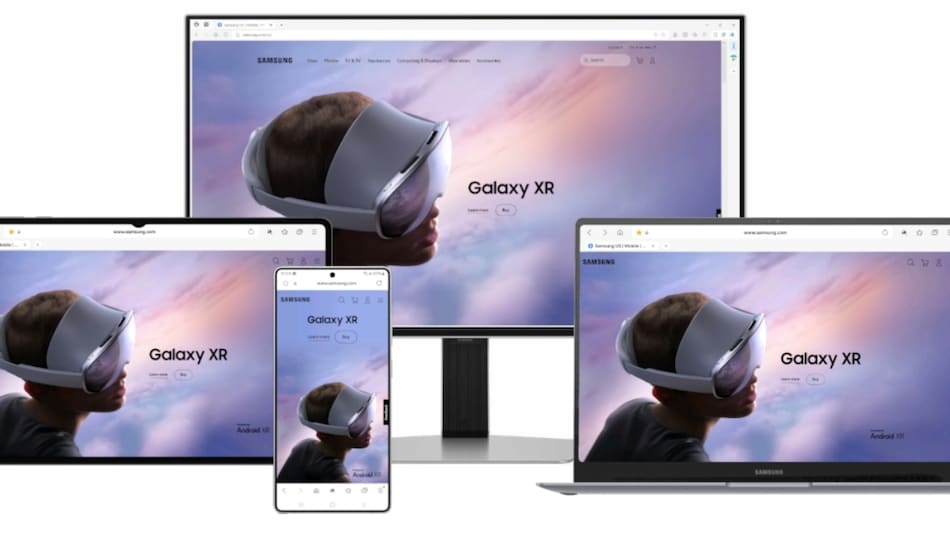Samsung Internet Browser Beta for Windows PCs Launched with Galaxy AI Integration
Samsung Internet for PC is equipped with the company's Browsing Assist feature, which uses Galaxy AI to summarise and translate webpages in real time.

Photo Credit: Samsung
Samsung Internet Browser beta is accessible to Windows 10 and Windows 11 users
Samsung has officially launched the beta version of its Samsung Internet browser for PC, bringing its popular mobile web experience to desktop for the first time. The browser is currently available for PCs running Windows 10 and Windows 11 in two countries, with plans for wider availability in the coming months. The move marks a major step in Samsung's efforts to expand its Galaxy ecosystem, offering users seamless browsing continuity across its range of smartphones, tablets, and laptops.
Samsung Internet Browser Beta Is Currently Available in Two Countries
The company recently announced the release of Samsung Internet for PC, marking the first time its mobile browser is officially available on a desktop computer. The beta, launched on Thursday, is accessible on Windows 10 (version 1809 and later) and Windows 11 users in the US and South Korea, with a broader rollout expected soon. To join the beta, go to this link and sign in with your Samsung account on the Samsung Developer Portal.
The desktop version of the Samsung Internet is designed to provide a smooth browsing experience across Galaxy devices by syncing bookmarks, history, passwords, and autofill details through Samsung Pass. Users can also resume browsing sessions on their PC from where they stopped on mobile, enhancing continuity within Samsung's ecosystem of smartphones, tablets, and Galaxy Book laptops.
Powered by Galaxy AI, Samsung Internet for PC introduces the Browsing Assist feature, which can summarise and translate webpages in real time, simplifying multitasking and research. Samsung says the browser will evolve from a standard web app into an “ambient AI” platform that learns from user behaviour to deliver personalised and context-aware assistance.
Privacy continues to be a core priority, with the Samsung Internet browser including intelligent anti-tracking systems and a live Privacy Dashboard that displays what information is being protected. These tools are intended to secure user data while ensuring consistent speed and usability.
With this expansion to desktop, Samsung could finally compete directly with Microsoft Edge, Google Chrome, and Mozilla Firefox, which are all available on mobile and desktop computers. The move also reinforces Samsung's vision of building a connected and intelligent Galaxy ecosystem that unites devices through cohesive design, strong security, and AI-enhanced browsing experiences.
Get your daily dose of tech news, reviews, and insights, in under 80 characters on Gadgets 360 Turbo. Connect with fellow tech lovers on our Forum. Follow us on X, Facebook, WhatsApp, Threads and Google News for instant updates. Catch all the action on our YouTube channel.
Related Stories
- Samsung Galaxy Unpacked 2025
- ChatGPT
- Redmi Note 14 Pro+
- iPhone 16
- Apple Vision Pro
- Oneplus 12
- OnePlus Nord CE 3 Lite 5G
- iPhone 13
- Xiaomi 14 Pro
- Oppo Find N3
- Tecno Spark Go (2023)
- Realme V30
- Best Phones Under 25000
- Samsung Galaxy S24 Series
- Cryptocurrency
- iQoo 12
- Samsung Galaxy S24 Ultra
- Giottus
- Samsung Galaxy Z Flip 5
- Apple 'Scary Fast'
- Housefull 5
- GoPro Hero 12 Black Review
- Invincible Season 2
- JioGlass
- HD Ready TV
- Laptop Under 50000
- Smartwatch Under 10000
- Latest Mobile Phones
- Compare Phones
- Redmi Turbo 5
- Redmi Turbo 5 Max
- Moto G77
- Moto G67
- Realme P4 Power 5G
- Vivo X200T
- Realme Neo 8
- OPPO Reno 15 FS
- HP HyperX Omen 15
- Acer Chromebook 311 (2026)
- Lenovo Idea Tab Plus
- Realme Pad 3
- HMD Watch P1
- HMD Watch X1
- Haier H5E Series
- Acerpure Nitro Z Series 100-inch QLED TV
- Asus ROG Ally
- Nintendo Switch Lite
- Haier 1.6 Ton 5 Star Inverter Split AC (HSU19G-MZAID5BN-INV)
- Haier 1.6 Ton 5 Star Inverter Split AC (HSU19G-MZAIM5BN-INV)

















